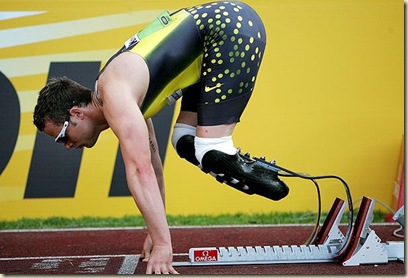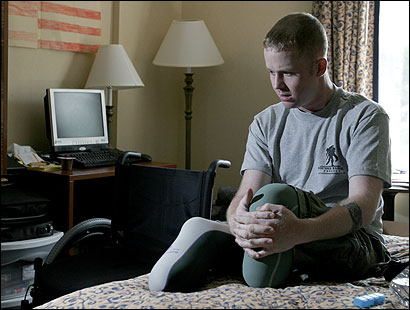 Amid the uproar over the nomination of Honorable Sonia Sotomayor—the “reverse racist” and “hack,” at least to Rush Limbaugh, a deejay who should know about qualifications for the bench (I believe they taught that lesson during one of the two semesters he attended Southeast Missouri State University before dropping out1)—Republican critics have been unable to assail her on her record: it is impeccable. Instead, they have attacked her for one sentence in one speech and for one court decision.
Amid the uproar over the nomination of Honorable Sonia Sotomayor—the “reverse racist” and “hack,” at least to Rush Limbaugh, a deejay who should know about qualifications for the bench (I believe they taught that lesson during one of the two semesters he attended Southeast Missouri State University before dropping out1)—Republican critics have been unable to assail her on her record: it is impeccable. Instead, they have attacked her for one sentence in one speech and for one court decision.
The sentence: “I would hope that a wise Latina woman with the richness of her experiences would more often than not reach a better conclusion than a white male who hasn't lived that life” (Berkeley Law lecture, 2001).
The case: Ricci v. DeStefano.
But these two criticisms are not the point of this post.2 Senator Jeffrey Beauregard Sessions III (R-Alabama and new ranking member of the Judiciary Committee) is.
In a recent interview with CBS’ Bob Schieffer, Sessions said:
"[Sotomayor] criticized the idea that a woman and a man would reach the same result," something he said is "philosophically incompatible with the American system."
"I am really flabbergasted by the depth and consistency of her philosophical critique of the ideal of impartial justice," he said.
Aside from misrepresenting (or simply not understanding) her positions (see the footnotes), Sen. Sessions knows first hand the trials and tribulations of being nominated to the federal bench. His was an unsuccessful appointment to the U.S. District Court in Alabama by President Reagan in 1986. As Sarah Wildman reported in The Atlantic:
Senate Democrats tracked down a career Justice Department employee named J. Gerald Hebert, who testified, albeit reluctantly, that in a conversation between the two men Sessions had labeled the National Association for the Advancement of Colored People (NAACP) and the American Civil Liberties Union (ACLU) "un-American" and "Communist-inspired." Hebert said Sessions had claimed these groups "forced civil rights down the throats of people." In his confirmation hearings, Sessions sealed his own fate by saying such groups could be construed as "un-American" when "they involve themselves in promoting un-American positions" in foreign policy. Hebert testified that the young lawyer tended to "pop off" on such topics regularly, noting that Sessions had called a white civil rights lawyer a "disgrace to his race" for litigating voting rights cases. Sessions acknowledged making many of the statements attributed to him but claimed that most of the time he had been joking, saying he was sometimes "loose with [his] tongue." He further admitted to calling the Voting Rights Act of 1965 a "piece of intrusive legislation," a phrase he stood behind even in his confirmation hearings.
It got worse. Another damaging witness--a black former assistant U.S. Attorney in Alabama named Thomas Figures--testified that, during a 1981 murder investigation involving the Ku Klux Klan, Sessions was heard by several colleagues commenting that he "used to think they [the Klan] were OK" until he found out some of them were "pot smokers." Sessions claimed the comment was clearly said in jest. Figures didn't see it that way. Sessions, he said, had called him "boy" and, after overhearing him chastise a secretary, warned him to "be careful what you say to white folks."3
The entire article contains many more examples that demonstrate why Sessions is an authority on racism, although they simultaneously argue his inability to know it when he sees it.
For a party in crisis, Sessions seems like a curious choice for standard-bearer especially on this issue.
Especially when, for Justice Samuel Alito, making decisions based upon ethnicity is cool (source Glenn Greenwald).
At his Senate confirmation hearing, Sam Alito used his opening statement to emphasize how his experience as an Italian-American influences his judicial decision-making (video is here):
But when I look at those cases, I have to say to myself, and I do say to myself, "You know, this could be your grandfather, this could be your grandmother. They were not citizens at one time, and they were people who came to this country" . . . .
When I get a case about discrimination, I have to think about people in my own family who suffered discrimination because of their ethnic background or because of religion or because of gender. And I do take that into account.
Two weeks ago, Alito cast the deciding vote in Ricci v. DeStefano, an intensely contested affirmative action case. He did so by ruling in favor of the Italian-American firefighters, finding that they were unlawfully discriminated against, even though the district court judge who heard all the evidence and the three-judge appellate panel ruled against them and dismissed their case. Notably, the majority Supreme Court opinion Alito joined (.pdf) began by highlighting not the relevant legal doctrine, but rather, the emotional factors that made the Italian-American-plaintiffs empathetic.
Did Alito's Italian-American ethnic background cause him to cast his vote in favor of the Italian-American plaintiffs? Has anyone raised that question? Given that he himself said that he "do[es] take that into account" -- and given that Sonia Sotomayor spent 6 straight hours today being accused by GOP Senators and Fox News commentators of allowing her Puerto Rican heritage to lead her to discriminate against white litigants -- why isn't that question being asked about Alito's vote in Ricci?
Two words, Glenn: Rocky. Balboa.
1He may feel he is an expert, though, because his family is loaded with Reagan-appointed judges (cousins, uncles, etc.), part of the 200+ judicial appointment juggernaut that conservatives tend to forget when a Democratic president appoints, say, anyone.
2With respect to her statement about a “wise Latina woman,” over 30 years of feminist scholarship has amply demonstrated the importance of standpoint with respect to issues of discrimination—marked as Other by dominant culture, any person whose identity has been constructed as beyond-the-pale by dominant culture has a unique ability to interrogate that culture’s dominant ideology in a way those whom the ideology validates simply do not. Why? Those who are valorized by dominant culture rarely if ever see that ideology work against them. The ideology—and this is the nature of hegemonic ideology,
a la Antonio Gramsci—makes itself seem natural, common-sense based, and most of the people who the ideology favors do not consciously participate in the marginalization of and discrimination against others. Such unconscious participation is a product of institutional racism, sexism, ableism, and so on. For most of us—who institutionally marginalize one or more groups without meaning to—the worst part of the issue is the denial that such institutional discrimination exists and the reluctance to acknowledge one’s own complicity with that ideology (let alone changing one’s behavior).
In short, to really breakdown these institutionalized, hegemonic ideologies of oppression, we all have to do what Michel Foucault calls “negative work,” meaning we must question the validity of our own beliefs, disrupt the seemingly-causal narrative of history, and imagine how, in our given historical moment, a given belief, action, or utterance is made possible.
Ricci v DeStefano, however, is fascinating, and not just for the reasons the mainstream media has been touting. Consider this, from Media dis&dat:
People for the American Way, a liberal group, noted July 13 that Ricci got his firefighting job in New Haven "by claiming discrimination under the Americans with Disabilities Act, which protects Americans from discrimination over disabilities." Ricci has dyslexia, a learning disability that impairs the ability to read.
First, dyslexia and the people who have it are routinely disserviced by this oversimplification of it. Second, the perspective of this article (and rightly so, to a point) is to suggest that Ricci is being represented by this “liberal group” as an emblem of all people with disabilities, in that he is self-focused and narcissistic (meaning, he is so wrapped up in his own narrative and suffering that he does not or cannot see the issues of others without disabilities around him). Agreed.
However, and here’s what the article does not really account for, from all accounts and details of the case, he IS self-focused. Discriminated against because of deficits attributed to his dyslexia, Ricci was able to use the ADA of 1990 to get his job in the first place. However, the Second Circuit Court of Appeals (under which Sotomayor ruled on the case before it went to the U.S. Supreme Court) upheld the New Haven' Fire Department’s decision to abandon the results of the written and oral examinations (as designed by I/O Solutions ("IOS")) for Captain and Lieutenant positions.
Most accounts explain the NHFD’s motivations thusly (and here comes a general paraphrase of most spokesholes): The NHFD was afraid, because none of the top scorers who would receive promotion for the results were minority candidates, that they would be sued. This sentiment prestructures the reader or listener (i.e. you, me, and Joe the Plumber) to the idea that candidates who are minorities will sue your business or government agency for discrimination and win no matter the validity of the claim, now doesn’t it? What if, though, the tests were designed (inadvertently or otherwise) on standards that seem “natural” due to institutional racism? If so, aren’t certain candidates being discriminated against? Admittedly, the NHFD seems to have acted out of hysteria, not interest in making sure their firefighters were being treated equally, and examples like this are what conservatives always cite when speaking ill of affirmative action (Ricci v DeStefano will be with us for awhile, folks).
But back to Ricci. As a person who at first was denied his job because of a perceived lack of ability due to a biological characteristic, he might be expected to be sensitive to other minority groups’ oppression at the hands of a dominant majority. He might be expected to believe that there could be merit to the claims that the test was an unfair measure because it did not account for deficits that could be attributed to culture, not biology. Moreover, Ricci exemplifies the problem with disability identity group formation—the tendency to see one’s problems as different and individual, not part of a large social bloc of the oppressed.
3 Like Stevens, I have often been disappointed by Caucasian Americans for their pot-smoking, but mainly when it interferes with my ability to navigate quickly out of a parking spot at Red Rocks Amphitheater or to purchase stamps at the local post office.







 On April 4, 2008,
On April 4, 2008,  only one Miss Landmine. Or, in this case, two. A group of ten women competed for two titles, Miss Landmine 2008 and Miss Landmine Internet Winner. Miss Urica, the brick-and-mortar winner, was chosen by a panel of five Angolan government officials, while Miss Cuanza Sul, Maria Restino Manuel, was chosen as the Internet winner.
only one Miss Landmine. Or, in this case, two. A group of ten women competed for two titles, Miss Landmine 2008 and Miss Landmine Internet Winner. Miss Urica, the brick-and-mortar winner, was chosen by a panel of five Angolan government officials, while Miss Cuanza Sul, Maria Restino Manuel, was chosen as the Internet winner. 





